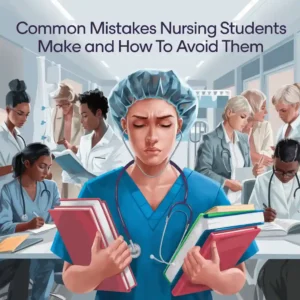In the field of nursing, students can find immense satisfaction, although doing it is no easy task. While pursuing their degrees, nursing students can fall victim to certain traps that can stop them from progressing. Understanding how to identify the pitfalls can certainly help aspiring nurses.
Thank you for reading this post, don't forget to subscribe!
1. Poor Time Allocation
Students often struggle to manage time when it comes to attending lectures, rotations, school tasks and even personal interests. Some students tend to procrastinate, which leads to panic attacks and increased anxiety before examinations.
How to Avoid:
Create a Structured Schedule: Schedule a specific time in which you wish to study, attend classes and even relax.
Prioritize Tasks: Perform any tasks that have deadlines that are coming up soon first.
Utilize Planning Tools: Keep track of deadlines and important dates by using a planner or a digital calendar.


2. Ignoring Self-Care
The nursing curriculum is often so rigorous and demanding that most students fail to take care of themselves, causing extreme exhaustion which directly affects productivity.
How to Avoid:
Schedule Regular Breaks: While studying or working for long hours, ensure to take short regular breaks.
Maintain a Healthy Lifestyle: Determine a sleeping, eating and exercising schedule and stick to it.
Seek Support: Speak to your friends, mentors and counselors if you feel stressed out.
3. Overreliance on Memorization
In nursing, like many other domains, critical thinking skills are very important. Memorization is encouraged but relying on it only can do more harm than good.
How to Avoid:
Understand Concepts: Focus on the why behind the procedures and diseases.
Apply Knowledge: Work on case studies and simulations to experience how theory is implemented in practice.
Ask Questions: In lectures and clinicals, try to question the rationale behind the actions in order to learn better.
4. Ineffective Study Strategies
Study habits differ from individual to individual. Students academically underperforming is bound to have their own study habits that are counterproductive.
How to Avoid:
Diverse Study Methods: Use a combination of audiovisual materials, class group activities, and hands-on work as the standard approach.
NCLEX Practice Questions: Routinely using practice questions is a vital aspect to detecting gaps of knowledge and becoming accustomed to the test.
Work Review: Instead of leaving it for the last minute, conducting material reviews regularly will make retention easier.
5. Avoiding Clinical Experience Opportunities
The most basic assumption is some students lack confidence or fear being exposed to real-life situations in practice.
How to Avoid:
Clinical Rotation Phobia: These should be approached from the perspective of applying what you have learned.
Feedback: Learning is a process and you should not be afraid of asking your peers and teaching staff suggestions to help you improve your skills.
After each clinical session, evaluate what was accomplished and which areas require additional focus.
6. Inadequate Communication skills
One of the key communication aspects is nurses talking to patients. Poor communication can cause detrimental rehabilitation actions to be undertaken.
How to Avoid:
Active Listening Training: Focus on what patients as well as fellow staff members say, and make sure to understand what is being communicated prior to replying.
Thorough and Timely Documenting: Write down patient information in a precise and timely manner.
Team Involvement: Participate in case discussions to foster team communication.
7. Neglecting the Importance of NCLEX Preparation
If the exam is not completed with the preferred score, a nursing license and job opportunities may be lost. Postponing or not preparing for NCLEX can have serious repercussions down the line.
How to Avoid:
Do Not Delay: Start preparing for the NCLEX examination right after obtaining your degree instead of waiting until later.
Engage in NCLEX Review Courses: Enroll and participate in programs that directly focus on NCLEX test preparation or provide structured NCLEX focused materials.
Full-length practice examinations should be conducted under exam conditions in order to allow the candidate to adjust to the new environment.
8. Not Looking for Help When Necessary
In many cases, people, particularly students, may remain stuck because of pride or fear and reluctance to ask for help. This leads to unresolved problems, other issues and problems in one’s cognitive schema.
How to Avoid:
Acceptance of Ignorance: It’s okay to not have all the answers.
Direct Contact with the Teacher: Do not be afraid to explain your issues to lecturers and ask for help.
Formulas and Supporting Peers: Work together with classmates to enhance understanding and help each other.
9. Not Appearing Open To Feedback
Overlooking feedback can be detrimental in personal as well as professional aspects.
How To Avoid:
Be Open: Constructive feedback can help towards improving your work.
Act On Feedback: Directly address any suggestions you are given.
Self Evaluation: Strive to evaluate your own work in context to improvement.
10. Unprofessional Attitude
Unprofessionalism in nursing, as in any profession, is costly. It can hurt someone’s reputation and future career opportunities.
How To Avoid:
Confidentiality: Always protect the patient’s privacy when dealing with sensitive information.
General Appearance: Comply with the policy on professional dressing and grooming.
Time Management: Attend classes, clinical sessions, and scheduled meetings for appointments punctually.
11. Overindulgence in Activities Not Related to Studies
Participating in numerous extracurricular activities or working too much can cut into time for studying and sleeping.
How To Avoid:
Make Achievable Goals: Limit time spent on nonacademic activities.
Do Not Take Unnecessary Burdens: Politely refuse offers that may lead to additional work.
Plan Relaxation: Budget time to simply rest without any activities.
12. Neglecting Networking Opportunities
A lot of nursing students do not recognize the significance of engaging with other students, faculty members, and healthcare professionals. Forming these relationships early on can provide internship, job, and mentoring opportunities as well as further your career.
How To Avoid:
Interact with Other Students: Take part in group conversations for assignments, study groups, as well as nursing students’ society.
Reach Out to Mentors: Get assistance and career insights from informed nurses with years of experience.
Attend Conferences & Workshops: Attend nursing events to learn about new innovations and meet future employers.
13. Lack of Effective Decision Making Skills
Nursing practice goes beyond mere following of given instructions. It also includes the students ability to put reasoning to situations. Students without critical thinking will find it very difficult to function out in the field.
What To Do:
Always Ask Questions: In situations when new material is being taught, determine the reason “why” something is happening and “what” the process is.
Take Part in Exercises that Promotes Thought Processes: Get involved in the growing trend of case-based and problem-based learning.
Develop the Skill to Make Split Second Decision: Get used to the idea of making accurate decisions within short time frames during intense situations.
14. Inability to Shift with Changes in Technologies
The world of healthcare is everchanging and a student’s willingness to embrace technology will determine how successful they are as a nurse today and in the future.
What To Do:
Get Acquainted With the Electronic Health Record (EHR): Getting a grasp of patient documentation is essential since a lot of hospitals do not maintain paper records.
Monitor Changes in Medicine: Reading nursing and health journals and keeping updated with new gadgets and methods aid the nurse’s knowledge.
Practice Using Medical Devices: Acquire practical experience with some key nursing tools such as infusion pumps and patient monitoring equipment.
15. Struggling to Calculate Medication Doses
Serious medication errors may occur due to poor dosing calculations. Learning pharmacology and dosage calculations can be very difficult for many nursing students.
How to Avoid:
Learn Basic Math: Freshen up on the more fundamental aspects of math, such as conversions and proportions.
Work Through Problems: Complete exercises based on dosage calculation on a regular basis.
Check Calculation Accuracy: Remember to check your dosage calculations before taking medication.
16. Lack of Self Efficacy for Skills
These students do not perform procedures or do not offer their input because they are afraid to make a mistake. Not having self efficacy affects learning as well as patient care.
How to Avoid:
Engage in Practice Activities: Sharpen your skills in simulation labs before going for clinical rotations.
Don’t Hesitate to Ask: Consult with your preceptors or experienced nurses about your performance.
Self Remind: Realize that making mistakes is part of the learning process and accept that improvement is what matters.
17. Delaying Preparation for a Real Job Interview
Not being prepared for a job application until graduating might be disadvantageous for students.
How to Avoid:
Create an Impressive CV: Emphasize your clinical experience, coursework, any relevant certifications and skills.
Show Up for Mock Interviews: Exposing yourself to an interview situation will help build self confidence.
Secure Internships: Acquire valuable skills and accept additional employment opportunities during the healthcare workforce before graduation.
Conclusion
Nursing school, as and when, is tough, but circumventing these typical pitfalls contribute towards achieving the goal. Effective time management alongside prioritizing personal health, real-life experiences, and active engagement with new information is ideal. Taking initiative, seeking assistance, developing solid professional skills are all important in that they will ensure a fulfilling career in nursing.
FAQS
- What is the leading mistake made by nursing students?
Poor time management skills is the leading mistake as it greatly increases stress levels and studying becomes much less efficient.
- How do nursing students prevent burnout?
Nursing students will counteract burnout by practicing self-care, cultivating a healthy work-life balance, and asking for assistance when required.
- What makes networking essential for nursing students?
Networking can assist students in discovering suitable employment, mentors, and other avenues of professional development.
- How can clinical skills be developed in nursing students?
Frequent practice and supervision, along with participation in clinical skills training, would bolster the skills required.
- What are some effective study techniques for nursing students?
Some active learning methods are case studies, practice tests, and debates, as they are proven to produce better results.
- How early should I start preparing for the NCLEX?
To maximize your preparation for the NCLEX, it is recommended to begin studying at least six months prior to graduation.


